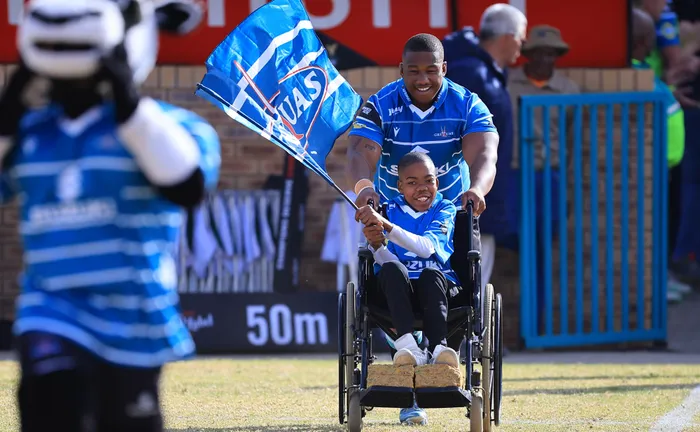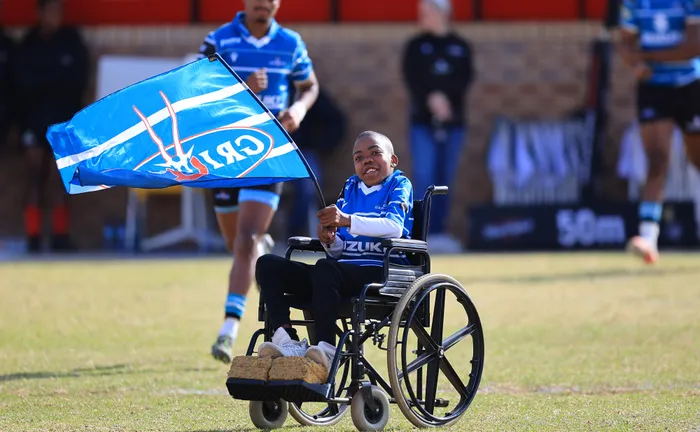OPINION: Why sports heroes must never forget who’s watching

A young boy in a wheelchair, Tshepo Tsiane, leading the Suzuki Griquas onto the field against the Boland Cavaliers served as a powerful reminder of the immense influence sportspeople have on their supporters, especially children who look up to them as heroes, and how a simple act of kindness or acknowledgement from a player can inspire a lifetime of dreams and admiration.
Image: Danie van der Lith / DFA Newspaper
This past Sunday, as the Suzuki Griquas prepared to take the field against the Boland Cavaliers, something quietly powerful unfolded before the first whistle was even blown. A young boy, confined to a wheelchair, proudly led the team onto the pitch. That moment went beyond being merely symbolic; it actually served as a reminder of what sport truly represents.
For many young boys and girls in the stands, the rugby field is more than just a patch of grass, because to them it’s a stage where heroes are born. To that child in the wheelchair, and to countless others watching from the sidelines or on their screens, the players on that field aren’t just athletes but models, living proof that dreams can be chased.
Speaking to the DFA, Tshepo Tsiame shared the unforgettable moment that made his weekend one to remember. “My teacher called me and said she had a surprise for me. She told me I would be pushed onto the field by the Griquas captain, Cebo Dlamini, to lead the team out against the Sanlam Boland Cavaliers. I was very excited,” he said with a smile.
A proud Griquas supporter, Tsiame revealed that his two favourite players are George Whitehead and Cameron Hufke. “It really meant a lot to me because all three of my brothers play rugby, and I can’t. But for a moment, I got to experience what it feels like to be in the centre of the field, surrounded by the crowd. It was amazing.”
To make the moment even more special, Tsiame was gifted an official Griquas jersey, which he says he will proudly wear every time the team plays again.
Children don’t look up to players because of how many tries they score or how much they earn. They idolise them because they represent strength, resilience, and passion. And that admiration carries a deep responsibility.
Too often, top athletes walk past young fans with outstretched arms, not even glancing their way. They rush through mixed zones, avoid eye contact at airports, and shrug off autograph requests like it’s an inconvenience.
Somewhere along the line, they start believing they are bigger than the game itself.
But the truth is, no one is bigger than the game. And the game doesn’t belong to them, no; it belongs to the supporters who fill the stands week in and week out, the kids who save pocket money for tickets, and the communities who wear team colours with pride.
The smallest gesture, be it a signed shirt, a smile, or a moment of acknowledgement, can light a fire in a young heart that burns for a lifetime.
Take the youngster in the wheelchair. That moment, being alongside the Griquas players, will live with him forever. He will tell that story for years, not because he led a team out onto the field but because his heroes let him share in their world, even if just for a brief few minutes.

Tshepo Tsiane proudly sits with his Griquas flag in hand as he leads the Griquas out for their match against the Sanlam Boland Cavaliers.
Image: Danie van der Lith / DFA Newspaper
That is the real power of sport: not just to entertain, but to elevate. To inspire. To give hope.
A player may not remember the fan they ignored, but that fan will always remember being ignored. Likewise, a player may not recall every shirt they sign, but the kid on the receiving end might carry that memory into adulthood and maybe one day into their own professional sports career.
Rugby, like all sports, is built on more than performance. It’s built on connection. And as long as our heroes remember to slow down, to smile, to wave to the stands and stop for a moment of human contact, the game will continue to grow.
However, the converse is also true; if players forget, if they isolate themselves from those who believe in them most, then the game loses something far more valuable than trophies or titles; it loses its heart.
So here’s a message to every sports star out there: You’re being watched. Not just by fans, but by dreamers. And how you treat them could shape their future, and the future of the sport you love.
Never forget the power you hold, because with great power comes great responsibility.
Related Topics: